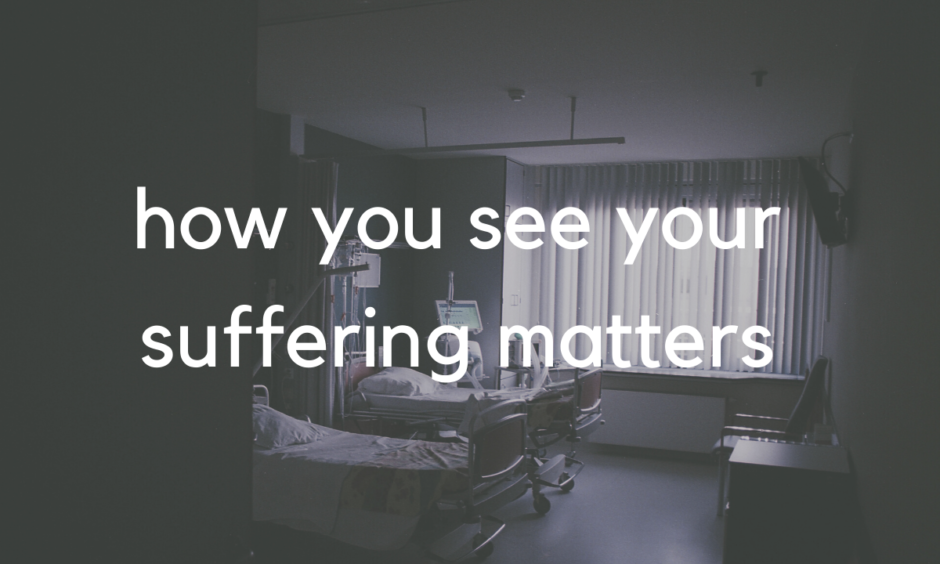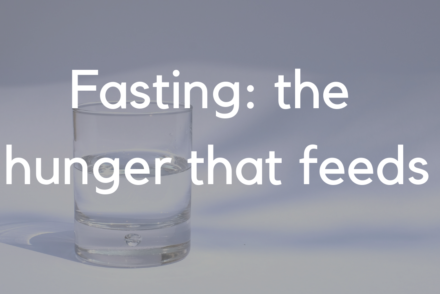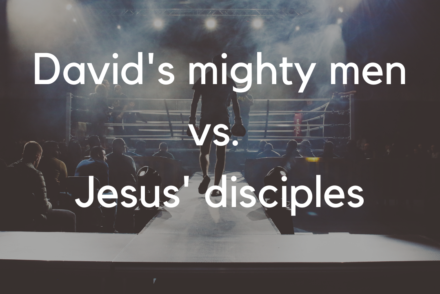Jesus and his disciples left Galilee and went up to the villages near Caesarea Philippi. As they were walking along, he asked them, “Who do people say I am?”
“Well,” they replied, “some say John the Baptist, some say Elijah, and others say you are one of the other prophets.”Then he asked them, “But who do you say I am?”
Peter replied, “You are the Messiah.”
But Jesus warned them not to tell anyone about him.
Then Jesus began to tell them that the Son of Man must suffer many terrible things and be rejected by the elders, the leading priests, and the teachers of religious law. He would be killed, but three days later he would rise from the dead. As he talked about this openly with his disciples, Peter took him aside and began to reprimand him for saying such things.
Jesus turned around and looked at his disciples, then reprimanded Peter. “Get away from me, Satan!” he said. “You are seeing things merely from a human point of view, not from God’s.”
Then, calling the crowd to join his disciples, he said, “If any of you wants to be my follower, you must give up your own way, take up your cross, and follow me. If you try to hang on to your life, you will lose it. But if you give up your life for my sake and for the sake of the Good News, you will save it. And what do you benefit if you gain the whole world but lose your own soul? Is anything worth more than your soul? If anyone is ashamed of me and my message in these adulterous and sinful days, the Son of Man will be ashamed of that person when he returns in the glory of his Father with the holy angels.”
Mark 8:27-38 NLT
We live in a broken world. Suffering is a guarantee, whether it comes in the form of a debilitating chronic illness or having to juggle kids being home from school for two weeks and still having to somehow work your full time job. Suffering is a part of reality, but we get to decide how we view it.
How you view the suffering in your life matters. Why? Because how you view a thing will significantly shape how you experience and respond to it.
In Mark 8 we see two significantly different views of suffering and pain. In Mark 8 Jesus’ disciples finally make explicit their belief that Jesus is indeed God’s anointed messiah, the one come to save God’s people.
The thrill of voicing aloud this earth-shaking truth shouldn’t be underestimated. To his followers this meant that Jesus was going to fulfill hundreds of Old Testament promises and restore Israel to power, wealth, and security. They, his closest followers, were going to be insiders in the process and, so they likely expected, get in on plenty of the benefits of being close with the chosen one of God.
However, to the disciple’s surprise and chagrin Jesus’ response to their confession of belief is to describe how he’s going to suffer brutally and be killed. Peter can’t take it. He won’t hear from his friend and newly acknowledged messiah that there’s suffering and death in his future. With his typical brash boldness Peter rebukes Jesus.
In turn Jesus rebukes Peter saying, as the NLT puts it; “You are seeing things merely from a human point of view, not from God’s.” The rebuke was surely a sharp slap in the face to Peter and to the other apostles who likely were thinking what Peter was saying.
These verses bring up a question for us. When you experience suffering in your life which perspective do you see it from? Are you with Peter, seeing from a “merely human point of view”? Or do you see your suffering from God’s point of view? They are two drastically different things.
The human view of suffering
We can draw several implicit truths about the human view of suffering from Peter’s rebuke of Jesus.
1. Godly people shouldn’t suffer
Peter reprimands Jesus because the primary view in the Jewish religion was that a righteous person wouldn’t suffer. Therefore, if Jesus really is the messiah he of all people shouldn’t have to suffer.
The implicit view of many Christians today is almost identical. We have the expectation that if we are godly, follow the prescribed rules and recommendations, and live a wise life then it is somehow unjust for us to experience pain or inconvenience.
2. If God was good he wouldn’t allow it.
The belief that godly people shouldn’t suffer is intimately connected with this second piece of the human view of suffering; if God was good he wouldn’t allow suffering and pain.
The problem is that this belief is stuck firmly in a human-centric perspective. It assumes that our view is ultimate. It assumes that God’s perspective and end goal are the same as ours, and that for God to be good nothing “bad” can happen under his watch. Peter implies this when he reprimands Jesus, as if Jesus saying he would suffer is somehow saying something negative about God.
3. A good life is a life without suffering
The third piece of the human view of suffering is that the quality of one’s life is impacted by the amount of suffering experienced. The ideal life is idyllic, without toil or struggle. Those who live the good life are those who don’t have worry, pain or care.
In Peter’s view the messiah was the one who would live the ultimate good life, leading God’s people to full restoration and paradise on earth. That couldn’t happen if the messiah lived a life marked by the evil of suffering.
4. Suffering is either purposeless or punishment
Part of the reason that the good life is one without suffering is because the good life is one full with purpose, and suffering seems – from a human perspective – to be purposeless. How could there be a (good) purpose behind pain?
The other human perspective is that any suffering in one’s life must be a punishment for some wrong done or good undone. This is the view that Job’s friends take in their long discussion throughout the central chapters of the book of Job. If Job is suffering it must be because he’s done something that has displeased God.
5. The current moment is what matters most
At its most basic the human view of suffering is shaped by the belief that the current moment is what matters most. Human life is about making, as the saying goes, “the most of every moment” and finding pleasure in the now.
The heavenly view of suffering
Jesus’ sharp rebuke to Peter and his following statement about losing one’s life to gain one’s soul can teach us much about the heavenly view of earthly suffering. On almost every point it stands in stark contrast to the human view.
1. Godliness doesn’t eliminate suffering
Where the human view assumes that the more godly one is the less suffering they will endure, God’s view is that oftentimes the exact opposite is true. In a broken world that is opposed to God, the more godly you are the more likely you will suffer.
This is certainly the case for Jesus. It was his very god-ness that caused his suffering. Because he was holy and followed the will of his Heavenly Father the world opposed, abandoned, tortured, and killed him.
2. God’s goodness is often most evident in and through suffering.
While the human perspective questions God’s existence when suffering shows its face, the heavenly perspective sees that God’s goodness is most powerfully displayed in and through suffering.
Jesus’ death and resurrection are the most potent, powerful revelation of God’s goodness. In a broken world marred by sin the full depth of God’s love and goodness couldn’t be displayed apart from suffering and death. Because the Father was good and loved humanity, Jesus lovingly embraced suffering.
It’s similar in our lives. Odds are you can look back over your path thus far and see that much of God’s greatest goodness to you was uncovered through the pain and suffering you endured.
3. A life without struggle and suffering is pointless
Contrary to the human view that a good life has little to no suffering, the heavenly view is that a life on this earth without struggle and suffering is purposeless. If your entire life is filled with relaxation, entertainment, and pleasure you are living a wasted life. Pity the person who has felt no pain!
No one wants to read a story where nothing happens. It’s the struggle and suffering in your life that makes your story powerful and beautiful and moving. Jesus affirms this when he declares, “If you try to hang on to your life, you will lose it. But if you give up your life for my sake and for the sake of the Good News, you will save it.”
Hanging on to your life almost always takes the form of trying to escape some sort of discomfort or pain. Giving up your life always requires the suffering and pain of loss, but results in much good when it’s done for Christ’s sake.
4. All suffering has a purpose
Jesus knew this truth well for himself. He told the disciples, “ the Son of Man must suffer many terrible things,” with the must making it clear that there was a purpose. His suffering wasn’t pointless. It was part of a beautiful plan and story being written by the Father of Lights.
This principle holds true beyond the single suffering of Jesus on the cross. Scripture is clear that, particularly for those who are in Christ, all your struggle, pain, and suffering has good purpose and reward. 1 Peter 1:6-9 describes our suffering as fire refining the gold of our faith. Romans 5:3-5 declares that suffering produces endurance, endurance strength, and ultimately produces in us a powerful hope that will never disappoint us.
5. The current moment isn’t the whole story
Last and perhaps most importantly, the heavenly view of pain and suffering knows deeply that the current moment isn’t the whole story. In fact it’s only a tiny and somewhat insignificant part of the story.
As Hebrews 12:2 says, Jesus endured the cross because he knew that greater things were to come. He knew that the suffering and torture he was to face would have an end. He knew there was an incredible reward on the other side of his earthly life that, as the Apostle Paul says, would make suffering seem like, “light and momentary affliction.”
The same is true for every one of Jesus’ followers. Your suffering here and now – whether it’s a few weeks of unexpected and dramatic changes in plans thanks to COVID-19 or a decade of fighting cancer or twenty years of struggling with same sex attraction isn’t the whole story. In fact, it’s the set up for the start of the story.
What perspective are you seeing from today?
So, my friends, what perspective are you viewing your life from today? Are you standing with Peter and rebuking your savior and God for the struggle and pain of your life? If so, don’t worry, he won’t take offense. He will, however, probably rebuke you and remind you that you have the option to “set your mind on things above, not on things that are on earth” (Col 3:2) rather than be trapped in the smallness of human viewpoints.
If you have the Holy Spirit in you you get to see things from God’s perspective. And, based on the lists above, that sounds like a much more enjoyable life. It may take some practice and some frequent resetting of our earth-distorted perspective to start making it a habit to see from a heavenly vantage, but it will be well worth it. Particularly in the chaotic times that we are currently in.
May we learn from Jesus’ rebuke of Peter and begin to see things with God’s eyes this week.





No Comments